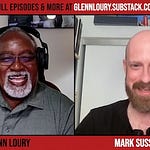On this week’s episode of The Glenn Show, I welcome my old friend Stephanie Lepp, the Executive Producer at the Center for Humane Technology. I first met Stephanie through her husband, Nathaniel, who was a student of mine at Brown. Stephanie produced a podcast called Reckonings, which told the stories of how people transform their worldviews. I went on the show in 2015 and told the story of the evolution of my own political worldview (links below). Since then, we've been wanting to do another round. It's time! This time, Stephanie joins me on The Glenn Show, to once again help me wrestle with how my views have changed and with my responsibilities as a public intellectual.
Stephanie begins by asking me to step back and consider a big-picture question: What is my goal as a public intellectual? It’s not something I often ask myself in such explicit terms, and Stephanie pushes me to articulate a response. Stephanie engages me on the affirmative action question in order to get me to speak not just about my critique of preferences, but to think about whether critique is enough. It’s one thing to criticize a program or idea, she says, and another to propose a solution. I agree, of course, but the critique does have to be made, and not just in the case of affirmative action. I see it as my job to make clear that the systemic prejudices affirmative action programs were designed to ameliorate are largely in the past. When we see large-scale failure in black communities today, the responsibility for those failures rests, to a great extent, on the shoulders of the members of those communities. Stephanie suggests that, given my position as a public intellectual, when I speak about these problems, I not only describe social reality but actually influence it. If that is true (and I’m not sure to what extent it is), should I reorient my way of engaging with matters of public concern? Stephanie says, “Evolution is beautiful, but it’s not pretty.” This leads me to wonder: Is our present political turmoil an ugly but necessary process that will result in improvement over time, if properly attended to? I'm doubtful. Finally, I offer a critique of Stephanie’s own brand of “promiscuous pragmatic pluralism.”
It was such a pleasure to reconnect with an old friend and talk through these issues. I’m looking forward to your thoughts!
This post is free and available to the public. To receive early access to TGS episodes, an ad-free podcast feed, Q&As, and other exclusive content and benefits, click below.
0:00 What is Glenn’s goal as a public intellectual?
11:12 Glenn has his critique of affirmative action …
21:57 … but is articulating the critique enough?
27:23 Glenn: My raison d’être is to give voice to my contempt for the failures of my people
36:36 Stephanie: At a certain point, you’re not describing reality, you’re influencing it
43:02 The case for integralism
51:39 “Evolution is beautiful, but it’s not pretty”
1:00:06 Glenn’s critique of Stephanie’s “promiscuous pragmatic pluralism”
1:06:47 A preliminary look into the married life of the Lourys
Reckonings, “The Conscience of a Public Intellectual, pt. 1”
Reckonings, “The Conscience of a Public Intellectual, pt. 2”
Reckonings, “The Enemy Within”
Chloé Valdary’s Theory of Enchantment
Ken Wilber’s A Theory of Everything: An Integral Vision for Business, Politics, Science, and Spirituality















Share this post